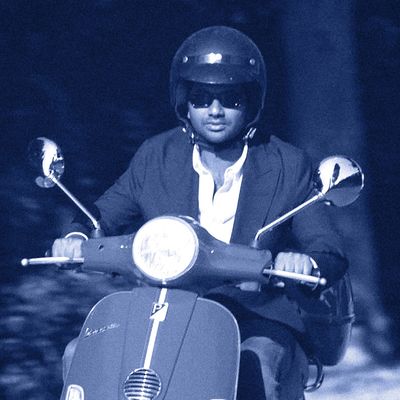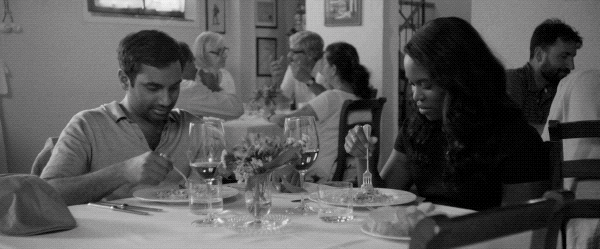
Ecco, signore e signori! Behold, ladies and gentlemen! Welcome to the premiere of Aziz-caps! As a special supplement to your regularly scheduled recaps of Master of None, we’ve asked New York Magazine cover star Aziz Ansari to give us the behind-the-scenes breakdown of the making of each episode, pieced together from multiple conversations over the past several months.
Episode 201: “The Thief”
First some context. At the end of season one, Dev decides to move to Italy to learn how to make pasta. It’s a plotline Ansari dreamed up early on because he’d always wanted to live in Italy, and he knew he’d need a significant break after spending a year of his life making the first season. Shortly after he and co-creator Alan Yang finished editing season one in mid-February 2016, he really did leave behind his New York life and move to Modena, a small city famed for the dish tortellini in brodo, about 25 miles west of Bologna and 90 miles north of Florence.
Before going there, he did two weeks of intensive Italian lessons (three hours a day) and then spent two months speaking almost exclusively in Italian and working in a pasta shop called Boutique del Tortellino and in the kitchen of Hosteria Giusti. Friends at Osteria Francescana (which had been named the world’s best restaurant earlier that year) also taught him cooking techniques. At night, he’d go home and watch classics from Italian masters like Michelangelo Antonioni or Vittorio De Sica to “crash course film school” before directing this episode, one of five he directed this season.
Concept
Thinking about season two early on, we started talking about how the season-one episodes we really enjoyed, like the “Parents” episode, the “Mornings” episode, are really ambitious conceptually. So we were like, “Let’s make every episode that creative.” The first episode is all in Modena and it’s in black-and-white, 70 percent in Italian. There are no characters from the first season, except me. [Laughs.] You don’t even see New York!
I told all the writers to watch all these older Italian films and see if any ideas come to them. It’s a huge challenge, that first one, because we knew we wanted to have Italy. So you’re in a different place, you have none of the familiar elements of the first season to bring you in, which is a little daunting. And then we were watching Bicycle Thieves, and Andy Blitz, one of our writers, suggested, “What if it’s like Bicycle Thieves, but he lost his phone?” And then from there it evolved to, “Oh, there’s this woman’s phone number in it” — the only woman he’s had a connection with in a long time. Obviously, it’s a little tricky paying homage to Bicycle Thieves, since the guy in that movie is in pretty dire straits. The only thing we could do to give Dev’s thing any kind of stakes is to make it about connection and love.
Style
As far as shooting it in black-and-white, we knew it was going to be an homage to these Vittorio De Sica movies. I’d shot some film photos of Modena, and when I looked at the rolls that were black-and-white, they looked really cool. And even on my phone when I adjusted to black-and-white, it just looked like the city would photograph well, so me and Alan talked to our DP [director of photography] and we decided to do it. Netflix was into it. I almost want no one to read anything about the season and just turn around and be like, “Is this just a little bit in black-and-white? Oh, shit! The whole thing’s in black-and-white!”
Making it 70 percent in Italian was based on real experience. Also, why make it easy on ourselves, right? [Laughs.] The other thing is that kid could only speak Italian! It would seem fake to me, living there, to have all those people know perfect English. Eric came to visit me when I was living in Modena and we went to some restaurant and I was just speaking Italian with the waiter and I didn’t realize how crazy it was that I was speaking Italian, even at the level that I was. He was just like, “You’re fluent in Italian now?” I was like, “No, no, no, I’m not fluent.” He said, “You’re speaking a lot. It sounds like you know a lot.” I was like, “I guess I know a decent amount.” All the restaurants I worked at, none of those people speak English, all the ladies at Giusti, all the people at Boutique del Tortellino, they didn’t speak English. So I was speaking a lot of Italian while I was there, and I was just writing to the real experience I had.
Locations
It’s funny, we got to Modena and I knew the city so well from living there for two months — better than the location people in Italy because they’d never really shot in Modena. So I luckily had relationships with all these places: the pasta shop in the initial part, Boutique del Tortellino, I actually worked there; Hosteria Giusti, I worked there. When I walk through the kitchen in the back with Clare-Hope Ashitey, who plays Sara, the woman he meets as she’s trying to get into Hosteria Giusti], that’s the area I worked in and those were the real people that worked there.

When I was there, people didn’t know who I was. The ladies in the pasta shop were like, “Why do you have, like, a million Instagram followers? My daughter’s like, Who is this guy?” And then around town people would hear, “Oh yeah, this guy has a TV show and his character goes to Italy so he wants to do this …” And we came back a couple of months later with the full fucking thing and took over this town, like, shooting everywhere. Everyone’s like, “What the fuck?”
Casting
Clare-Hope Ashitey was auditioning for something else and our casting people saw her in New York. She came in, and she just killed it. She’s the person who’s pregnant in Children of Men, and she was great.
De Sica movies use a lot of non-actors and real people, so we took a cue from that a little for the Italian actors. Also, I like using real people when possible. So the woman at Giusti who has that conversation with me — “Oh, maybe this girl doesn’t like you” — that’s the real woman who works there. Her name is Romina, and she’s one of the ladies that taught me some cooking skills. When I went to ask for a job at Giusti, she was so funny and made fun of my bad Italian in the same way that she makes fun of me in that scene. I wanted Angela, the grandma from the pasta shop, to be in it, but she’s too old and there’s a health-insurance thing and we can’t insure her. I was very sad.
The thief’s mother who yells at me was my landlord, and she was really great, too! I couldn’t believe how she got into it. You have to make sure these people are somewhat comfortable before you put them in this thing, right? And I was just on the street with her a couple days before shooting that scene — we’d auditioned some people and they weren’t quite right. I was like, “What about her?” She has a great look. I just thought she could do it for some reason, so I asked her, “Just pretend you’re yelling from the window and I’m a cop.” And she did and I was like, “Oh my god, you’re perfect.”
The guy that kisses the phone, he’s a guy who lived in my building who I later found out is a former mayor of the town. We just loved his look. He pops up a few times. He’s the guy I say hello to when I’m riding my bike, he kisses the phone, and then in the beginning of the second episode he says, “Shhh.” I love that guy.
And then the main star of episode one is little Nicoló Ambrosio. Casting kids is tricky. It’s a really tricky thing to find a kid, especially when they have as big a role as he does in that episode. I think everyone in that crew fell in love with that kid. We did a casting call with all these kids and I watched the videos of the auditions. When I was in Rome we auditioned them in person and I would improvise with the kids and start talking with them. I would ask them stuff like, “What’s your favorite food?” And all the kids were very shy or very quiet and timid. Like, [mumbles] “spaghetti” or “lasagna.”
And then Nicoló’s like, “Oh, I like linguini with blue lobster!” And we’re like, “What?” [Laughs.] “Who is this kid?” He was just so animated and the improv was so funny and so alive in all the scenes we did. He made us laugh so hard. And Alessandra [Mastronardi, who plays Francesca] told me his mom told her that after the audition he left the room, when we were laughing so hard, he was like, “Yeah, I booked that.” [Laughs.] He’d never acted in anything! He’s just so confident.
Real-Life Inspiration
There was no real version of Dev’s date with Sara. In real life, I just had lunch by myself on my birthday at Hosteria Giusti [laughs]. But at night, my friends did bake a little tart for me with my name on it. If you go deep in my Instagram you’ll find it. It says Aziz. I don’t know the name of the tart, but they did do that, so that’s inspired by my real friends in Modena doing that.
Oh, the lasagna moment [when Dev is riding his bike across a piazza and a bag of lasagna gets stuck in the spokes and throws him to the ground], that actually happened to me. I was working at the pasta shop in the beginning and they taught me how to make lasagna. I finished the day and the grandma, Angela, was like, “You did a good job today, take some lasagna home for yourself.” So I texted my friend Alessandro, a guy who lives in Modena, and was like, “Hey, I have this lasagna from work, you want to eat some for lunch?” And he was like, “Ooh, that sounds great, let’s do it.” So I’m riding my bike home and it gets crunched up in the spokes just like it did in the episode. As soon as it happened I was so mad that I wasn’t going to eat the lasagna, but immediately it was one of those moments where I was like, “I believe this will end up in the show.”
And all the communication we do with Rachel post-breakup felt very real to us. Between episode one and episode two we were debating, okay, how do we show this Rachel stuff? Nowadays when you go through a breakup, so much of the post breakup communication is digital. It’s these kind of cautious emails.
At the end of the episode, Dev is really lonely. I mean, look, the whole point of this show is, look at this guy: He’s in Italy, blah, blah, blah, but what he’s really looking for is human connection. And he lost the one he found with this woman, Clare, and he reluctantly goes back into chatting with his ex-girlfriend, which I think he knows is bad. As he writes the email I think he knows, “This isn’t a good idea to engage with this. This person dumped me.”




